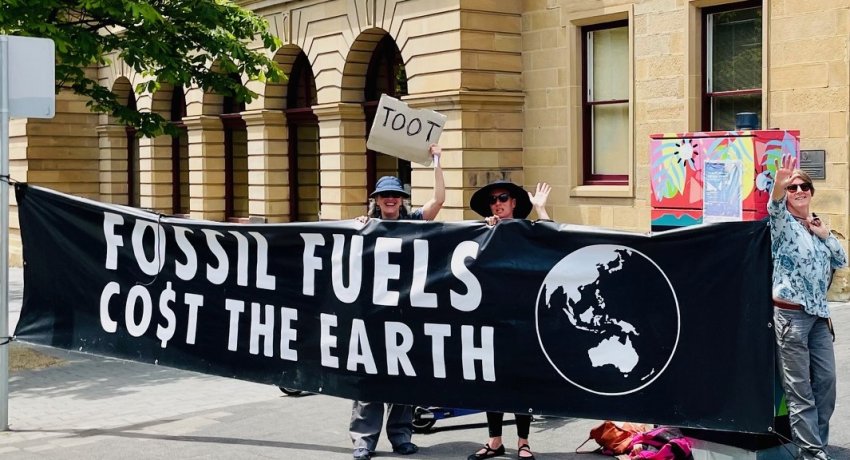
Last year was the warmest year since global records began in 1850, by a wide margin. The 10 warmest years on record have all occurred in the past decade.
Thanks to climate change, we face record-breaking heatwaves, droughts, bushfires and flooding disasters, with no let-up in sight.
Neither Labor nor the Liberals mentioned climate in their material in the last Tasmanian election and didn’t discuss it in their campaigns.
We dread another suite of Black Summer bushfires like those we battled in 2019–2020. Very hot, dry and windy conditions in recent weeks leave us feeling very nervous.
Now, more than ever, we need real climate leadership.
We would like to know which parties, or independents, will be bold enough to ban new fossil fuel projects or expansions?
Even the conservative International Energy Agency stated that there can be no new coal, oil or gas projects if the world is to avoid catastrophic climate change.
Yet the company HRCM proposes to construct a new underground coal mine near Fingal, that would allow 1 million tonnes of coal to be extracted each year. Gas exploration and seismic blasting is also being proposed for Bass Strait and offshore from North-Western Tasmania.
Who will stop our iconic native forests from being logged and shipped offshore?
In Tasmania, native forest logging emits 4.65 million tonnes of carbon dioxide annually. This is equivalent to 1.1 million cars.
Protecting these natural carbon stocks is the single biggest action we could take to reduce our state’s emissions. Ending native forest logging in Tasmania, like Victoria has, will achieve huge gains immediately.
A just transition plan would ensure that workers and communities benefit also.
While politicians like to give the impression that Tasmania is a climate leading state, in fact our much-touted net-zero status is largely due to the decline in the state’s forestry industry in the early 2010s.
Emissions from all other sectors (non-land use, land use change and forestry) keep rising (except for waste, which only accounts for a tiny share). In 2021 Tasmania was the only jurisdiction in the country to increase its absolute emissions (by 4%).
If MPs and candidates want to convince us that they are serious about climate, they would set ambitious targets to reduce carbon emissions in every economic sector by at least 60% by 2030 (compared with 2005 levels).
Tackling the cost-of-living crisis also needs to be high on their election agendas. The good news is that both cost-of-living and climate change can be addressed by the same policies.
All Tasmanians should be able to share in the benefits and cost savings associated with energy efficiencies, rooftop solar and electric transport.
Modelling by Rewiring Australia has demonstrated that full electrification would allow the average household to save $4660 per year in energy bills and vehicle costs by 2030.
The government should provide incentives to replace gas and wood heating with electric.
Who will respond to the Tasmanian Council of Social Service’s call to require rental properties to meet minimum energy performance standards to reduce rental poverty?
Who will provide funding to install measures, such as solar panels, insulation and efficient reverse-cycle air-conditioners, in low-income households and all public and social housing?
Tasmania lags behind all other states in residential energy ratings.
The National Construction Code now mandates the Nationwide House Energy Rating Scheme energy rating of 7 in all parts of Australia, except Tasmania, which has a lower rating of 6.
This means even our new houses are not as efficient as they should be and cost more to heat and run. Who will upgrade this mandatory rating?
Transport accounts for 22% of Tasmania’s total greenhouse gas emissions. Who will act on Climate Tasmania’s excellent transport report recommendations such as increasing the use of public transport by making services more frequent, cheaper, reliable and accessible; setting targets for 100% of all light vehicle sales to be electric by 2030, providing interest-free loans of $15,000 to purchase them, and 100% of new bus purchases to be electric by 2025?
Stronger climate action is the only reasonable course of action for any aspiring Tasmanian parliamentarian who understands the climate crisis and cares for their constituents. Only the most pro-active leaders deserve a seat in our next state parliament.
[The Tasmanian Climate Collective, which includes organisations and individuals, are surveying candidates on their climate action policies. Susan Austin is a member of the Tasmanian Climate Collective.]